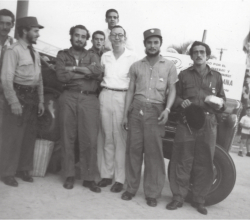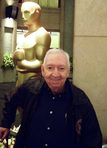Readability – Part 2

Jack in 1958 with rebels in Havana during the Cuban Revolution.
Since writing my last blog, I still notice many examples of people “writing to impress rather than express.” I fear that a lot of folks can’t be broken of the habit that the more three-plus syllables they use and the longer their sentences are, the better writer this makes them. No, no, no. Three-plus-syllable words and lengthy sentences are the foes of good readability.
A couple of years ago, I wrote a satirical novel by the name of VIVA LA EVOLUCION. Two of the things I poked fun at was our national trend toward being dreary and dumb.
At the beginning of my book, the directors of The National Esoteric Foundation (a bogus name) are choosing government grants for the coming year. Each director seems to have his or her favorite. One grant is a study to determine if eating meat from uncastrated hogs causes homosexuality in humans. Another, a comparative study of the rectal temperatures of Husky sled dogs and how their thermal variations impact Artic winter transportation in Alaska. Another director calls for an in-depth study of the mating habits of the Costa Rican blue-throated toad. Finally one director calls for an overhaul of the English language into something called Bureaucratic Latin or BuL for short. (Note: Believe it or not, all of these grants are real and were funded by the government. Hard to believe, right?)
I figured this week’s blog could be the passage from VIVA LA EVOLUCION dealing with BuL. It will be the best example of what you can and cannot do with writing. Your weapon in this fight is The Fog Index even though it is not mentioned in the selection below. It will, however, definitely help you tell the difference between BuL and good readability.
So, here from VIVA LA EVOLUCION is Dr. Elizabeth Strickler, the sponsor of BuL:
Dr. Elizabeth Strickler, a rather hefty, masculine woman in her early fifties, spoke up with authority and said, “I would safely say that my project takes precedence over any other here. Dr. Sydney Pinkwater, the noted linguist from the Advanced Language Research Center in Atlanta, Georgia, has applied to author a Bureaucracy Dictionary.”
“A what?” said Dr. Reichler as though he had no idea what she was talking about.
“The new language that is evolving in our country—Bureaucratic Latin—BuL for short. Dr. Pinkwater states in his application that before many more years, a totally new language will have been put into effect by our bureaucracy. He believes that it’s high time we had a dictionary so we can understand this new language.”
She walked over to a nearby table and turned on a slide projector. “Gentlemen, allow me to demonstrate with some visual examples of Dr. Pinkwater’s work. I will progress from the simple to the sublime, thereby giving us positive proof of the validity of this project.”
She flashed a picture of a trailer in a park up on the screen. “Voilà, gentlemen. In bureaucratic terms, this is no longer called a trailer but a mobile estate.”
She began changing photos in rapid succession. “This is not a bus driver but an urban transportation specialist. Likewise, this apparently foreign person is an undocumented worker. And, gentlemen, this is not a manhole cover but a sewage access structure closure device. She showed a slide of a man being beaten in a prison. This prisoner is not being tortured to get information. Instead he is the recipient of enhanced interrogation. The man in this following picture is no longer referred to as a junk dealer but instead as a reused metal processor. And this is not a classroom but an instructional module. And these children are not learning to read but are involved in text processing analysis. And now a little something extra for you gentlemen, especially you, Dr. Pencock.”
She flashed a nude beach scene up on the screen. Dr. Pearlmutter was embarrassed but the others openly gawked. She smiled triumphantly.
“No, gentlemen, this is not a nude beach. It is now referred to as a clothing optional zone.”
She turned off the projector and in a flourish of bravura glared at the others. “This is a whole new breathtaking world, gentlemen. A universe in which someone who is fired from his job is labeled a headcount reduction or you may prefer to say selected out. Lying is no longer lying but is a strategic misrepresentation; a malpractice case is a therapeutic misadventure and a common accident is an unmotivated event. Hookers and prostitutes will now be called happiness coordinators.”
Dr. Botsford raised his hand, “I’m sorry to interrupt your presentation, Dr. Strickler, but what good does all this falderal serve?”
“That should be quite evident, Dr. Botsford. Dr. Pinkwater’s book will revolutionize the English language to a new and loftier level. No longer will our hands be tied through dry, ordinary written and oral forms. We will be able to tell the truth without being ashamed of our words. Indignities in communicative intercourse will be a thing of the past.”
Dr. Hopkins politely raised his hand. “In a way, Dr. Strickler, I do see where you’re going. As a former government CPA auditor, I can safely say that numbers in the last 15 years have evolved into a new language themselves. Numbers can now convey whatever we want them to, and quite beautifully I might add. Creatively speaking, the numbers game has now become an amazing array of beguiling flattery. So what you’re saying is it’s now time to do the same thing with words.”
“Absolutely,” replied Dr. Strickler vigorously.
Dr. Pearlmutter had a smile that indicated he was completely lost. He raised his hand to speak. “Do you think, Dr. Strickler, it would be possible for you to give us an example of your project in action?”
“I’d be pleased to” she said with energetic gusto. “From Dr. Pinkwater’s application papers, I will read to you an article that appeared in The Pawhuska Gazette, Pawhuska, Oklahoma, dated August 12, 1921:
Willy Riley, local convicted horse thief, was sent to prison two years ago to serve a sentence of 15 years. After serving only 11 months, he managed to escape. He later was involved in several train robberies. He was chased down and caught by the famous federal marshal, Dan Truegood. Willy was quickly convicted and hanged last week at the state penitentiary.”
“The fellow got what he deserved,” shouted out Dr. Botsford.
“Dr. Botsford, that is not the point I’m trying to make,” she said gruffly.
“Then please get on with it,” he fired back.
With an agitated smile, she continued. “That was how the article was written then and for the most part how most journalists handle things up to the present time—just brimming over with indignities and mono-syllables. With The Pinkwater method, here is how the same article would be written:
Willy Riley, an indigenous person to Pawhuska, being economically challenged, recently was cause of a certain celebratory activity. The entrepreneurial skills of Mr. Riley in the past included the acquisition of valuable equestrian assets and vigorous dealings with several Oklahoma railroads. Two years ago, he devoted over a year of his life to service at a public institutional facility, finally taking leave to resume his dealings with the railroad. Last year he was a decisive participant in a prestigious investigation actuated by the renowned Federal Marshall Dan Truegood. Three days ago Mr. Riley passed away during an important civic function held in his honor at a government facility. The platform upon which he was standing collapsed.”
 So, there you have it. Do The Fog Index for both Willy articles and you will see what READIBILITY really is all about. In the next blog you will begin working on what it takes to become a good writer and how to effectively put The Fog Index into action.
So, there you have it. Do The Fog Index for both Willy articles and you will see what READIBILITY really is all about. In the next blog you will begin working on what it takes to become a good writer and how to effectively put The Fog Index into action.



